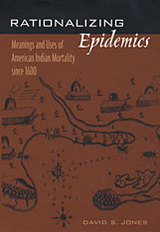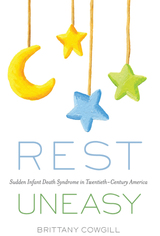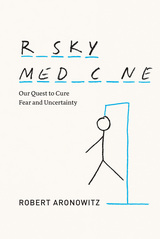107 books about Diseases and 5
start with R
107 books about Diseases and 5
107 books about Diseases
5 start with R start with R
5 start with R start with R

Rationalizing Epidemics
Meanings and Uses of American Indian Mortality since 1600
David S. Jones
Harvard University Press, 2004
Ever since their arrival in North America, European colonists and their descendants have struggled to explain the epidemics that decimated native populations. Century after century, they tried to understand the causes of epidemics, the vulnerability of American Indians, and the persistence of health disparities. They confronted their own responsibility for the epidemics, accepted the obligation to intervene, and imposed social and medical reforms to improve conditions. In Rationalizing Epidemics, David Jones examines crucial episodes in this history: Puritan responses to Indian depopulation in the seventeenth century; attempts to spread or prevent smallpox on the Western frontier in the eighteenth and nineteenth centuries; tuberculosis campaigns on the Sioux reservations from 1870 until 1910; and programs to test new antibiotics and implement modern medicine on the Navajo reservation in the 1950s. These encounters were always complex. Colonists, traders, physicians, and bureaucrats often saw epidemics as markers of social injustice and worked to improve Indians' health. At the same time, they exploited epidemics to obtain land, fur, and research subjects, and used health disparities as grounds for "civilizing" American Indians. Revealing the economic and political patterns that link these cases, Jones provides insight into the dilemmas of modern health policy in which desire and action stand alongside indifference and inaction.
[more]

The Red Cell
Production, Metabolism, Destruction—Normal and Abnormal, Revised Edition
John Harris
Harvard University Press, 1970
Every chapter in this classic on hematology has been entirely updated. Beginning at the molecular level, the book gives a detailed description of the way a red blood cell is produced, its metabolic processes, and how it is destroyed. Data and examples drawn from experiments illustrate current knowledge of the subject and substantiate conclusions. Although the work is clinically oriented, the text emphasizes the experimental approach to seeking the pathophysiology and mechanisms of disease resulting from alterations in the life processes of the red cell. Nearly 100 illustrations accompany the text.
[more]

The Reef
Elizabeth Arnold
University of Chicago Press, 1998
Elizabeth Arnold's first book of poems documents her struggle with cancer. A book-length sequence of poems, The Reef rockets the reader through a Heraclitean chute of accelerated life experience by way of anecdote, satire, facts from medical science, and lyrical sweep. This multilayered work explores the depths of illness, investigating the way one's attitude toward it changes over time and how one gathers and processes information in order to make sense of it.
"Arnold's poetry, much more mature than most writers' first book, links lyrics, slight narratives, and a bit of satire into a work of glorious affirmation. The book is a splendid read."—Mary Sue Koeppel, Florida Times-Union
"For this commitment to both the autobiographical honesty and aesthetic risk, The Reef should be valuable to anyone who has been waiting for where contemporary American poetry is going."—Agni
"Arnold's poetry, much more mature than most writers' first book, links lyrics, slight narratives, and a bit of satire into a work of glorious affirmation. The book is a splendid read."—Mary Sue Koeppel, Florida Times-Union
"For this commitment to both the autobiographical honesty and aesthetic risk, The Reef should be valuable to anyone who has been waiting for where contemporary American poetry is going."—Agni
[more]

Rest Uneasy
Sudden Infant Death Syndrome in Twentieth-Century America
Cowgill, Brittany
Rutgers University Press, 2018
Tracing the Sudden Infant Death Syndrome (SIDS) diagnosis from its mid-century origins through the late 1900s, Rest Uneasy investigates the processes by which SIDS became both a discrete medical enigma and a source of social anxiety construed differently over time and according to varying perspectives. American medicine reinterpreted and reconceived of the problem of sudden infant death multiple times over the course of the twentieth century. Its various approaches linked sudden infant deaths to all kinds of different causes—biological, anatomical, environmental, and social. In the context of a nation increasingly skeptical, yet increasingly expectant, of medicine, Americans struggled to cope with the paradoxes of sudden infant death; they worked to admit their powerlessness to prevent SIDS even while they tried to overcome it. Brittany Cowgill chronicles and assesses Americans’ fraught but consequential efforts to explain and conquer SIDS, illuminating how and why SIDS has continued to cast a shadow over doctors and parents.
[more]

Risky Medicine
Our Quest to Cure Fear and Uncertainty
Robert Aronowitz
University of Chicago Press, 2015
Will ever-more sensitive screening tests for cancer lead to longer, better lives? Will anticipating and trying to prevent the future complications of chronic disease lead to better health? Not always, says Robert Aronowitz in Risky Medicine. In fact, it often is hurting us.
Exploring the transformation of health care over the last several decades that has led doctors to become more attentive to treating risk than treating symptoms or curing disease, Aronowitz shows how many aspects of the health system and clinical practice are now aimed at risk reduction and risk control. He argues that this transformation has been driven in part by the pharmaceutical industry, which benefits by promoting its products to the larger percentage of the population at risk for a particular illness, rather than the smaller percentage who are actually affected by it. Meanwhile, for those suffering from chronic illness, the experience of risk and disease has been conflated by medical practitioners who focus on anticipatory treatment as much if not more than on relieving suffering caused by disease. Drawing on such controversial examples as HPV vaccines, cancer screening programs, and the cancer survivorship movement, Aronowitz argues that patients and their doctors have come to believe, perilously, that far too many medical interventions are worthwhile because they promise to control our fears and reduce uncertainty.
Risky Medicine is a timely call for a skeptical response to medicine’s obsession with risk, as well as for higher standards of evidence for risk-reducing interventions and a rebalancing of health care to restore an emphasis on the actual curing of and caring for people suffering from disease.
Exploring the transformation of health care over the last several decades that has led doctors to become more attentive to treating risk than treating symptoms or curing disease, Aronowitz shows how many aspects of the health system and clinical practice are now aimed at risk reduction and risk control. He argues that this transformation has been driven in part by the pharmaceutical industry, which benefits by promoting its products to the larger percentage of the population at risk for a particular illness, rather than the smaller percentage who are actually affected by it. Meanwhile, for those suffering from chronic illness, the experience of risk and disease has been conflated by medical practitioners who focus on anticipatory treatment as much if not more than on relieving suffering caused by disease. Drawing on such controversial examples as HPV vaccines, cancer screening programs, and the cancer survivorship movement, Aronowitz argues that patients and their doctors have come to believe, perilously, that far too many medical interventions are worthwhile because they promise to control our fears and reduce uncertainty.
Risky Medicine is a timely call for a skeptical response to medicine’s obsession with risk, as well as for higher standards of evidence for risk-reducing interventions and a rebalancing of health care to restore an emphasis on the actual curing of and caring for people suffering from disease.
[more]
READERS
Browse our collection.
PUBLISHERS
See BiblioVault's publisher services.
STUDENT SERVICES
Files for college accessibility offices.
UChicago Accessibility Resources
home | accessibility | search | about | contact us
BiblioVault ® 2001 - 2024
The University of Chicago Press









